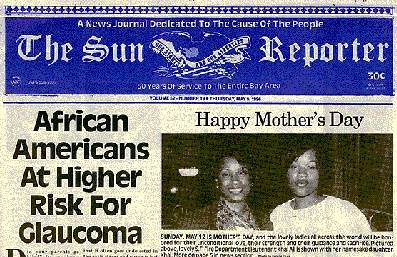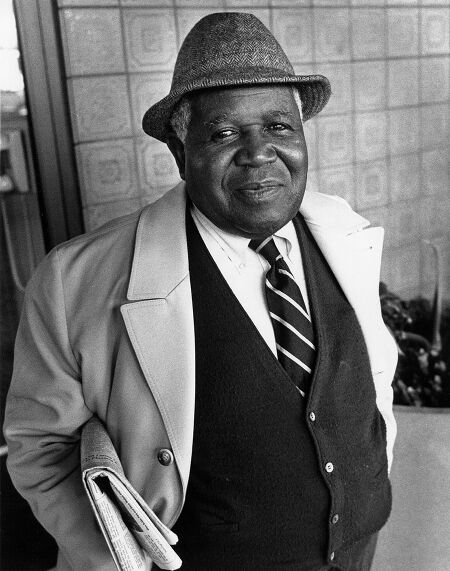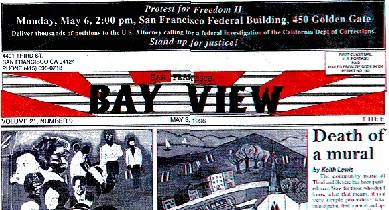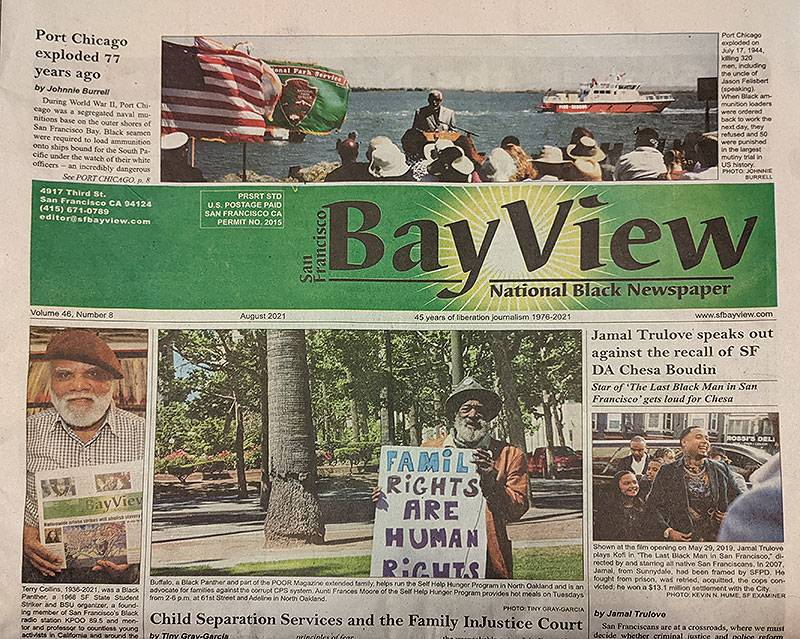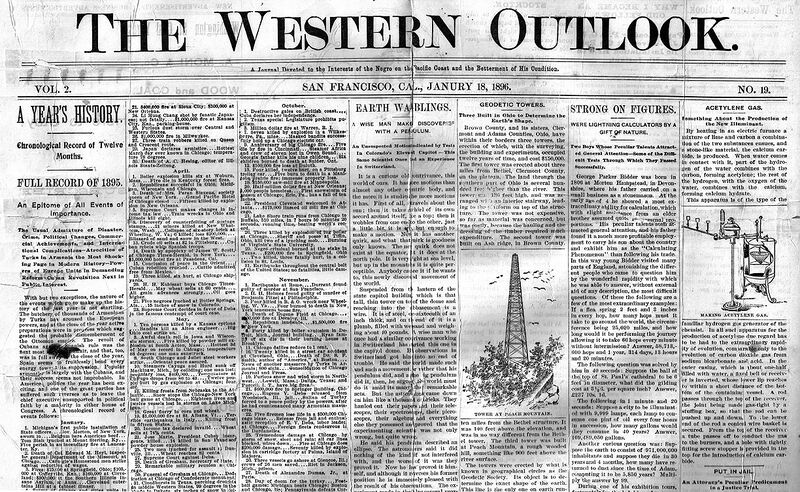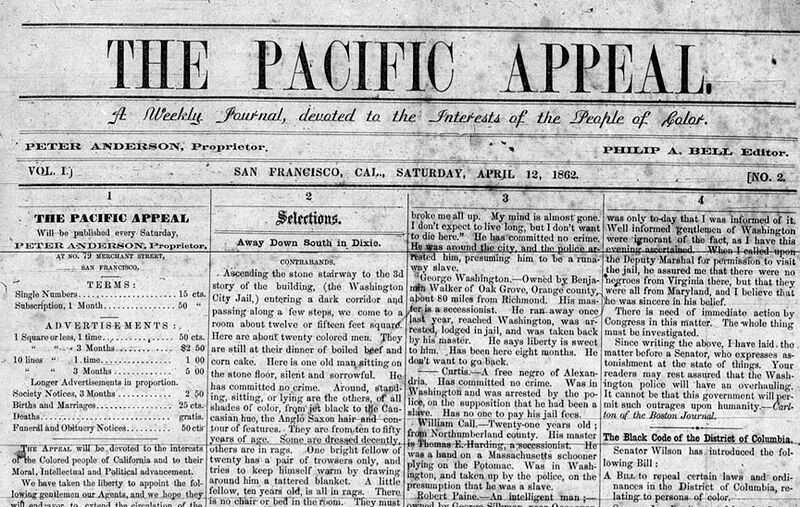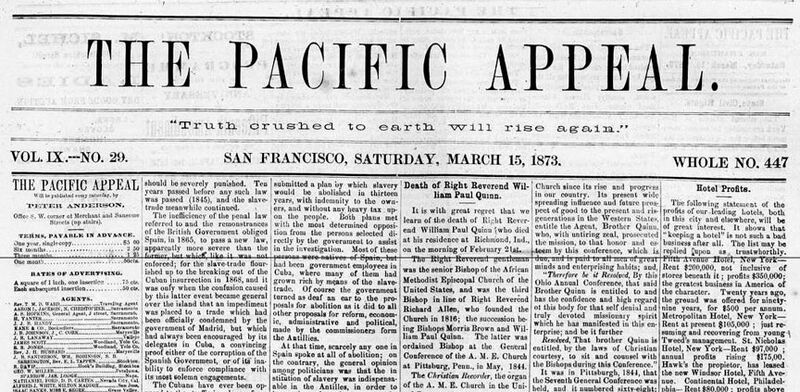The Black Press: Difference between revisions
(added Pacific Appeal mastheads) |
No edit summary |
||
| (2 intermediate revisions by the same user not shown) | |||
| Line 54: | Line 54: | ||
'''New Bayview newspaper''' | '''New Bayview newspaper''' | ||
[[Image:Sf-bayview-newspaper-august-2021.jpg]] | |||
'''The August 2021 edition of the ''San Francisco Bay View Newspaper'', still going!''' | |||
<hr> | |||
<font size=4>19th Century Newspapers Serving Black San Francisco</font size> | |||
[[Image:Western-Outlook-masthead-Jan-18-1896 72dpi 17in.jpg|800px]] | [[Image:Western-Outlook-masthead-Jan-18-1896 72dpi 17in.jpg|800px]] | ||
| Line 70: | Line 78: | ||
[[Origins |Prev. Document]] [[Fleming on Segregation |Next Document]] | [[Origins |Prev. Document]] [[Fleming on Segregation |Next Document]] | ||
[[category:African-American]] [[category:media]] [[category:newspapers]] [[category:1910s]] [[category:1920s]] [[category:1930s]] [[category:1940s]] [[category:1990s]] [[category:Famous characters]] [[category:1890s]] | [[category:African-American]] [[category:media]] [[category:newspapers]] [[category:1910s]] [[category:1920s]] [[category:1930s]] [[category:1940s]] [[category:1990s]] [[category:Famous characters]] [[category:1890s]] [[category:1860s]] [[category:1870s]] | ||
Latest revision as of 13:47, 29 March 2022
"I was there..."
Sun Reporter newspaper
Thomas Fleming (1907-2006)
on the history of the Black press in San Francisco:
The Spokesman was a weekly newspaper published by John Pittman, who was black. He was a graduate student on the Berkeley campus of the University of California. Of course we'd argue about the problem. When I say the problem I mean the race problem in the United States. John was very very liberal, you could almost say "ultra-liberal." It wasn't long before people started calling The Spokesman the "Little People's World." The People's World was a daily paper, published and edited by the Communist Party here in San Francisco. I had always been interested in writing for a newspaper—and writing period. I started coming over to San Francisco quite often to see John and then he asked me if I would write a few things for them. Our office was located at the corner of Baker and Sutter Street in a storefront building. In some way John managed to get a Linotype machine. He got another former student at Berkeley named Lawrence Nicholson, who was also a rebellious black, you would call them at that time, 'cause his father was a black physician in El Paso, Texas and sent Nick out here to go to school. Nick wasn't interested in going to school because his liberalism was too strong, he didn't see much need of it. His father was the black man who sued the state of Texas for the right to vote in Texas. That must have been 'round about 1928. So you could see where Nick was coming from. Then Mason Robeson was on the staff. He had dropped out of Cal because he became disgusted with the system.
Thomas C. Fleming, 1997.
Photo: Max Millard via Wikimedia Commons
The Spokesman was about 8 pages. I don't think it ever got any larger than that. Columns, and news, and John's editorials. There were cartoons if we could get a cartoonist, because John wasn't able to pay anyone. One of the things that attracted the attention of a lot blacks in the Bay Area was one column that was by John's lady friend Gladys, called "I Have Eyes." Any little gossip, whether it was dirty or clean, she would put it in this column. It was about what people were doing in the bars and other places like that. Well, a lot of people bought that paper, quite a few anyway, to see if their name was in there. That was a good seller for The Spokesman at that time. I know a few black professional people over there in the East Bay who became very unhappy about items that were put in "I Have Eyes"—ha, ha, ha, ha, ha, ha!
He wasn't able to get too much money. I don't think any publication can survive if it doesn't get advertising. He wasn't getting too much. The advertising he was getting was more in the nature of, well, sort of a courtesy. Like the Hibernia Bank would give us a small ad, and PG&E would give us a small ad, and maybe other big firms like that. They did it because I guess the person selling ads pestered them so much they wanted to get rid of him.
Pittman went on to become an editor of the People's Daily World. The People's World offered John more money than he was making on The Spokesman, that's why he closed it when he did. I never thought about joining the People's Daily World because this was a bigger paper, and I was still living on the other side of the bay. So I never gave that a thought.
During the General Strike in 1934 when the longshoremen called that strike, The Spokesman supported them editorially. I think it annoyed some conservative people here in San Francisco because a Vigilante Committee was formed. One morning when we came to The Spokesman office, somebody smashed out all the windows in there, got inside and smashed the keyboard of the Linotype machine and then wrote a note and laid it on top of the Linotype machine saying "you niggers go back to Africa." But we survived that.
There was the Western Appeal. That was owned and edited by a man named George Watkins, Sr. I had seen that paper when I first came to California in 1919 because you would see copies of from Oakland all the way up to Sacramento and all the other small towns in the Sacramento Valley where there were blacks living. Of course there weren't very many blacks living anywhere in the state of California then. I met Watkins because he'd stop in Chico and he had correspondents living in Sacramento, Marysville, Chico, Redding and Red Bluff. They had items in their columns about what blacks were doing in those cities, mostly about what the black churches were doing. In each one of those cities there was a black church. George Watkins was very conservative.
The Reporter was the first paper founded here in 1944. The Sun came the next year. The Sun was owned by a white man named Frank Lorent. He went down to Los Angeles and brought two blacks up here to edit the paper for him. But The Reporter was here for a year before the Sun came. Goodlet eventually acquired The Sun in a funny way. Frank Lorent told us he'd never met any blacks (he was born here in San Francisco) like us. So Frank used to come around every evening and Goodlet would have a poker game in his house. They got in a poker game over there one night and Goodlet was in to Frank for about $2,500. So Frank says, "I tell what you do. You give me $1,500 and you can have The Sun." And that's how we acquired The Sun. So we named it the Sun-Reporter, it sounds better saying Sun-Reporter than Reporter-Sun but The Reporter was our original paper here.
—Thomas Fleming, 91 years old, former editor of the Sun-Reporter in San Francisco, 1944-1994, interviewed on Saturday, January 9, 1999 at his home on Fillmore Street in San Francisco by Chris Carlsson, with assistance from Caitlin Manning, Joe Caffentzis and Max Millard.
History of the Sun-Reporter
Courtesy of Sun-Reporter website
In 1945, the Sun-Reporter was born. With the massive migration of blacks to the Bay Area to work in the wartime shipyards, the sudden change in population made it clear that if blacks were to have a voice they had to have a newspaper, and the Sun-Reporter became that paper. First came The Reporter in 1944, founded and edited by Thomas C. Fleming, which soon merged with The Sun, a paper acquired in a poker game by Dr. Carlton B. Goodlett, Fleming's longtime friend; and thus the Sun-Reporter was launched, with Goodlett as Editor/Publisher, Dr. Dan Collins as Co-Publisher, and Fleming as Managing Editor. In 1951 Goodlett became sole publisher, and in 1971 Dr. Goodlett added the seven Metro-Reporters and the California Voice to his publications.
Dr. Goodlett was born July 23, 1914 in Chipley, Florida and educated in the public schools of Omaha, Nebraska after which he earned a Bachelor of Science degree from Howard University in 1935, a Ph.D. in Psychology from UC Berkeley in 1938, and a Medical degree from Meharry Medical College, Tennessee in 1944. When he settled in the Bay Area he opened his medical offices in San Francisco, where his diagnostic skills and commitment to family practice made him an important addition to the medical profession and the emerging black community. Throughout his career he administered to hundreds of patients, many of whom he served without charge. He was one of the few doctors who still made home visits.
Besides being an outstanding physician, Dr. Goodlett capitalized on his early interest in journalism (as editor of the Hilltop, Howard University's student newspaper) by becoming publisher of The Sun-Reporter, a fighting, crusading newspaper designed to take on all the social and political battles raging in post-war America and proudly carrying the motto, ”That no good cause shall lack a champion, and that evil shall not thrive unopposed."
From its inception, and it holds true today, the Sun-Reporter has taken a strong editorial stand against racism, segregation, war and inequality while actively fighting for civil rights, fair employment and housing laws, and world peace; early on, it challenged school segregation; it denounced Senator Joseph McCarthy's assault on civil liberties in the days of the Cold War. Dr. Goodlett was in constant touch with Paul and Eslanda Robeson and was largely responsible for bringing Paul for a concert to Third Baptist Church when all other venues were prohibited to him.
In 1963 the Sun-Reporter office was moved to Dr. Goodlett's new building on Turk Street, where he could more efficiently pursue both his medical practice and the business of running a newspaper. The Sun-Reporter, with its upstairs Community Room, became a focal point for the community. Many events took place there, including visits from Malcolm X, Muhammad Ali, Dick Gregory, and the Black Panthers. Some young and talented journalists started their careers at the Sun-Reporter and moved on, including Lance Gilmore, Edith Austin, Belva Davis, Valerie Coleman and many more. Phil Burton, Art Agnos, Jerry Brown, Willie Brown, George Moscone, Cecil Poole, Ron Dellums, Barbara Lee, Mervyn Dymally, Aileen Hernandez, Dolores Huerta and many other prominent political figures dropped by the Sun-Reporter for advice and counsel.
In 1951 Dr. Goodlett joined the National Newspaper Publishers Association, the Black Press of America, and served three terms as its president. He also served as chair of the California Black Leadership Council and as president of the San Francisco branch of the NAACP and led a protest against the Municipal Railway for discrimination of African Americans. He became an active mover in the Democratic Party and in 1966 ran for Governor of California in the Democratic primaries, with Sy Cassidy, Dick Gregory and Rev. A. Cecil Williams as sidekicks in the Goodlett for Governor campaign. He ran under the motto, "The people are wise—wiser than the politician thinks!" and with a platform demanding "an economic floor below which no one can fall!" He came in third in a field of six.
Dr. Goodlett was on the Presidium of the World Peace Council and traveled extensively to every continent during the days of the Cold War, heading American delegations to conferences in Stockholm, Moscow, East Berlin, Accra, Helsinki, Prague, Sofia, Budapest and Copenhagen. He formulated a world disarmament plan that is to be found to this day in the Congressional Record. He was vehemently against the war in Vietnam, and urged his friend Dr. Martin Luther King, Jr. to take on this cause, stating "It is our urgent responsibility to address ourselves to the critical needs at home, so long neglected during our preoccupation with the arms race, with a government whose instruments have been geared to serve only the rich and the powerful of the land." He actively opposed nuclear weapons, and in a speech before the National Medical Association said, "No nuclear war can be won; neither can a nuclear war be limited to regions of the world. There is no medical treatment of those persons surviving a nuclear holocaust—in fact, the living would envy the dead."
Dr. Goodlett died of Parkinson's disease in 1997 at the age of 82, though the Sun-Reporter lives on.
New Bayview newspaper
The August 2021 edition of the San Francisco Bay View Newspaper, still going!
19th Century Newspapers Serving Black San Francisco
Western Outlook newspaper, January 18, 1896
Pacific Appeal, July 12, 1862
Pacific Appeal, March 15, 1873

